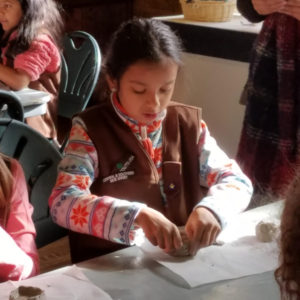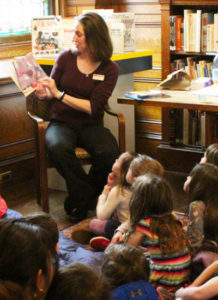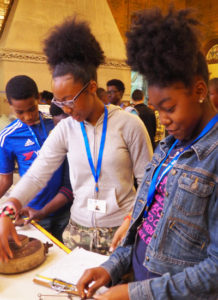Schools & Educators
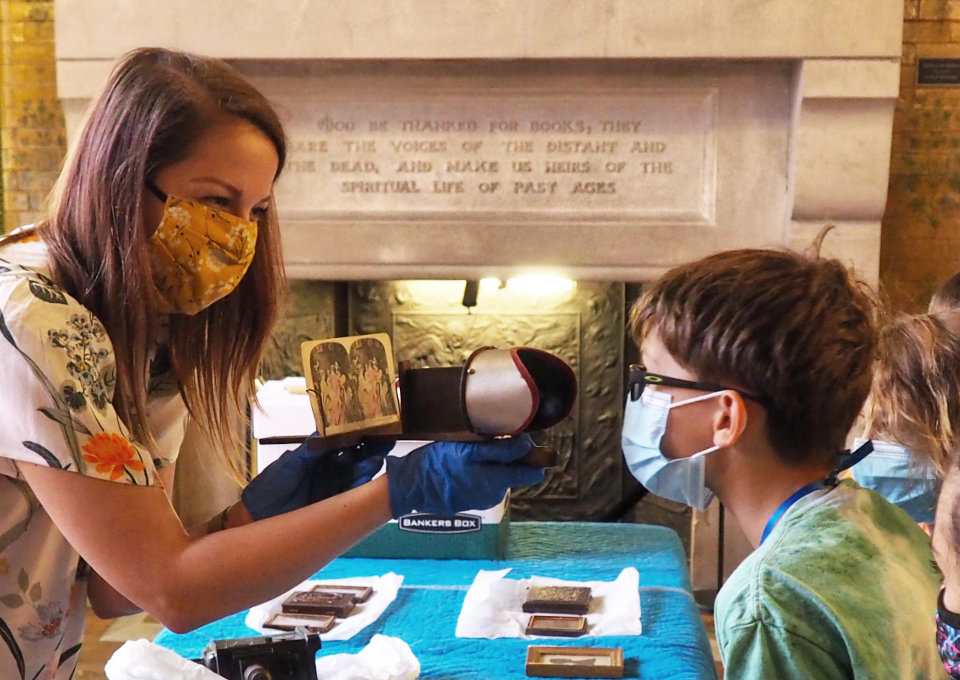
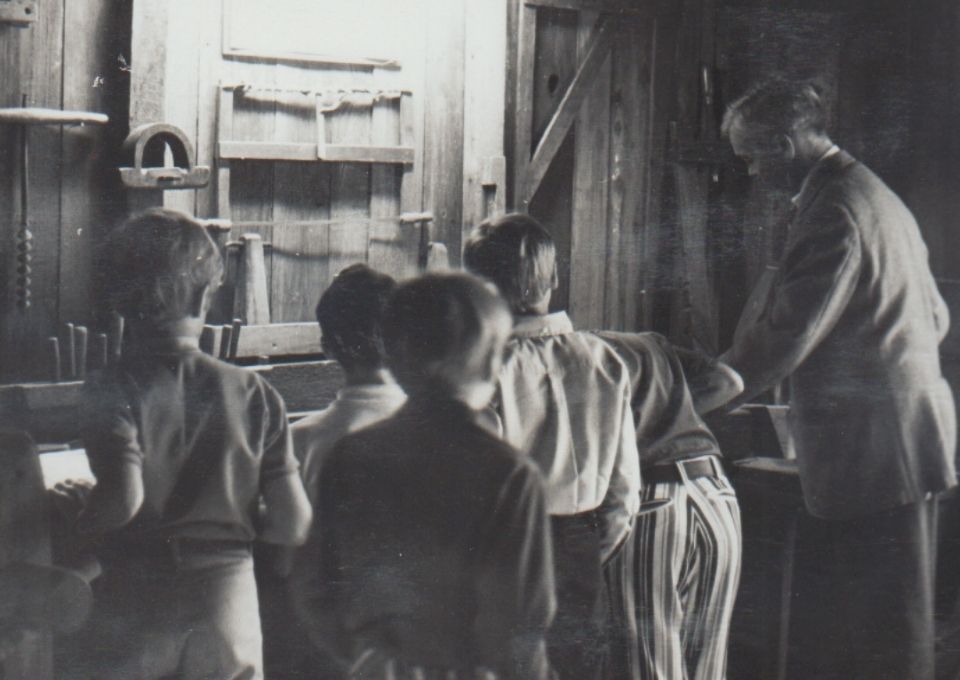
School Programs
Give your students a museum experience unlike any other!
METC Education programs inspire learners of all ages to ask questions about the world around us. Using the history of the early New Jerseyans as our backdrop, our programs emphasize the intersection of history and cultural heritage in New Jersey and support the NJ State educational curriculum. Each one of our specialized programs incorporates authentic materials and objects. We offer programs from ages Pre-K to Grade 12 and can tailor programs to meet your needs. From the first steps inside our historic building to the active learning sessions to the exciting exhibits, our educational programs encourage imagination, critical thinking, student inquiry and project-based learning while supporting a lifelong love of learning.
Planning your program
How do I book a program? Please complete the online form and a member of our Education Department will be in touch.
What’s the typical format for a field trip? Field trips located at METC use both the Education Annex as well as the exhibits located in the main museum building. Moving between these locations entails crossing the street. Most programs are designed to last 1.5 hours and we can accommodate booking two programs on the same day. We can also add time for lunch and visiting the museum store.
How much does it cost? In person field trips at METC cost $10 per student per program, with a minimum charge of $100. Most of our programs include a take home craft, and depending on your schedule, up to two programs can be booked for each trip.
When do you offer field trips? Field trips can be scheduled Tuesday through Friday, 10:00 – 4:00. We have limited availability on Mondays.
How many students can I bring? Due to our unique historical location, we do have a capacity of 55 students. For groups larger than this, we can break your group up into multiple visits.
Can we bring our lunch? An indoor space may be available for your students to eat lunch, and arrangements must be made in advance.
How many chaperones should we have? One adult for every 10 children is recommended. Classroom teachers and chaperones must remain with their students during the program.
Is the museum and education annex accessible? The Museum building is accessible in compliance with the standards of the Americans with Disabilities Act. A ground-level entrance with an elevator allows barrier-free access to all public levels of the museum building. The Education Annex has limited accessibility – please discuss accessibility needs when you book your trip.
Do your programs meet NJ Learning Standards? Yes, each program meets grade-specific standards. These are listed in the Standards and Objectives guide listed under each program.
Do your programs have pre and post-visit materials available? Yes, you can find our prepared pre and post-visit materials in the Additional Activities guide listed under each program.
Can you come to my school? Yes, METC offers both Outreach and Virtual programs for schools unable to attend in person. Outreach programs last about 1.5 hours, generally include a craft, and have a base cost of $250 plus travel expenses. Virtual programs last about an hour and have a base cost of $100. We can also provide a craft add-on for an additional cost.
Do you offer financial assistance? METC strives to make its education programs accessible to all and we have limited access to scholarship funding for schools and other educational organizations. If program fees or transportation restrictions are what’s preventing you from scheduling a field trip, please complete this form to let us know about your needs and we will review and respond.
Tell me more about the Craft Add-on for Virtual Programs. Our Education Department can suggest which craft programs might be good for your group. Supplies sent to you as part of a Craft Add-on are yours to keep. METC does not provide basic supplies such as markers, glue sticks, and scissors. Your students will each get a physical take away to complement their learning experience. Supplies for optional craft add-ons can either be shipped to a single location for an additional shipping fee or may be picked up at the museum. Any program that includes supplies must be booked at least 6 weeks in advance
Available Programs
Pre-K to 2nd Grade
Learn about griffins, gargoyles and other mythological creatures. Hear the legend of St. George & the Dragon and enjoy our Griffin Garden. Role-play the part of the dragon, hear other dragon stories, and make a dragon to take home.
Let’s Play! Experience how Early American children played, discover how early toys were made, and learn how “free time” has changed and stayed the same.
In person field trips include interacting with objects from the Museum’s Education collection and painting tops.
What was it like to be a child living in Early American times? Was it very different from how children live today, or are there similarities? Participants will act out a day-in-the-life of a child living on an early 1800s farm, problem-solving the challenges they faced.
In person field trips include interacting with objects from the Museum’s Education collection and making clay marbles.
Early Americans developed tools to save time and energy using simple machines. Explore the functions of the inclined plane, screw, lever, wedge, wheel & axle, and pulley through close-up examination of the Museum’s artifacts. In cooperative learning groups, present findings to the class.
In person field trips include hands-on examination of objects from the Museum’s Education Collection and decorating a simple machine to take home.
Students will use METC’s beautiful building to explore how architecture combines form and function in a unique way. They will explore different shapes and functions using the beautiful METC and Education Annex buildings.
In person field trips include taking rubbings of the METC building and making an architecture shape collage!
Students compare 21st and 19th century learning and school life, while examining reproduction 19th century school supplies to experience being a student in a one-room schoolhouse.
In person field trips include hands-on examination of objects from the Museum’s Education Collection and trying their hand at writing with a quill and dip pen on a “hornbook” to take home.
3rd to 5th Grade
Students compare 21st and 19th century learning and school life, while examining reproduction 19th century school supplies to experience being a student in a one-room schoolhouse.
In person field trips include hands-on examination of objects from the Museum’s Education Collection and trying their hand at writing with a quill and dip pen on a “hornbook” to take home.
Use METC’s beautiful building to explore how architecture combines form and function in a unique way. Discover different architectural techniques and terms, then design a stained-glass window inspired by the ones in the METC building. “Take home” parts of the METC building by creating rubbings from the building itself.
Explore the difficult challenges immigrants encountered in the mid-1800s and the factors that drove so many to make this choice. Students will experience what it meant to travel from far away countries to settle in New Jersey by taking on the roles of real 19th century New Jersey immigrants. The museum’s exhibits and artifacts will provide context to help students understand the ways in which these diverse groups worked together to solve the challenges their communities faced, and to relate these individual stories to the present.
In person field trips feature hands-on examination of objects from the Museum’s Education Collection.
Become a citizen in an early 19th century community. Who did you depend on and interact with? What was your role in the community? Learn about the blacksmith, the miller, the cabinetmaker, the farmer and more, while exploring their interconnectivity and interdependence within their communities.
In person field trips include hands-on examination of objects from the Museum’s Education Collection and becoming a Tinsmith Apprentice while making a tin-punching craft.
What was this object used for? What problem did it solve for its user? What does it tell us about life in the past? Students will examine objects from the Museum’s collection and have fun trying to figure out how it would have been used in the 1800s.
In person field trips include hands-on examination of objects from the Museum’s Education Collection and exploring the museum’s exhibits to discover more objects and how they bring the past to life.
Be inspired to change the world around you! This program examines social justice through the lens of the ways in which several New Jersey activists achieved change and the role ordinary individuals play in improving the world around them.
Explore the impact of the American Revolution on New Jersey civilians with varied perspectives on the conflict, including Tories, enslaved people, iron workers and farmers. METC’s historic artifacts enhance and contextualize the program and a creative writing activity completes the program.
In person programs come with interactions with our museum exhibits and education collection. It also includes completing a quill writing activity with a quill pen and ink.
6th to 8th Grade
Explore the impact of the American Revolution on New Jersey civilians with varied perspectives on the conflict, including Tories, enslaved people, iron workers and farmers. METC’s historic artifacts enhance and contextualize the program and a creative writing activity completes the program.
In person programs come with interactions with our museum exhibits and education collection. It also includes completing a quill writing activity with a quill pen and ink.
Use METC’s beautiful building to explore how Richardsonian Romanesque architecture combines form and function in a unique way. Discover what makes Richardsonian Romanesque distinctive, then design your own METC inspired building.
In person experiences include “Taking home” parts of the METC building by creating rubbings from the building itself.
What was this object used for? What problem did it solve for its user? What does it tell us about life in the past? Students will examine objects from the Museum’s collection , figuring out how each object would have been used in the 1800s and what they implied about the person who owned them.
In person field trips include hands-on examination of objects from the Museum’s Education Collection and exploring the museum’s exhibits to discover more objects and how they bring the past to life.
This program provides information about what a person’s voting rights are in NJ. It then simulates the voting process from the individual submitting a ballot to the electoral college’s vote.
Students will reflection how the voting process makes them feel and then write an argument about whether the electoral college should continue to be a part of the voting process today.
This program explores conflicts from the interpersonal level to the societal level. After gaining a better understanding about what conflict is, students will examine leaders from the civil rights movement and analyze their leadership styles.
Students will then have the chance to reflect on how they would resolve future conflicts in their lives.
This program provides an overview of how the United States Supreme Court listens to cases and makes decisions. After learning about the process, students will use this process to listen to arguments on real supreme court cases and make their own decision. Once the entire class has come the overall conclusion, they will find out how the supreme court actually decided when the case went through the system. Finally, there will be a final debrief discussing the system and their thoughts on the process itself and how the simulation played out.

